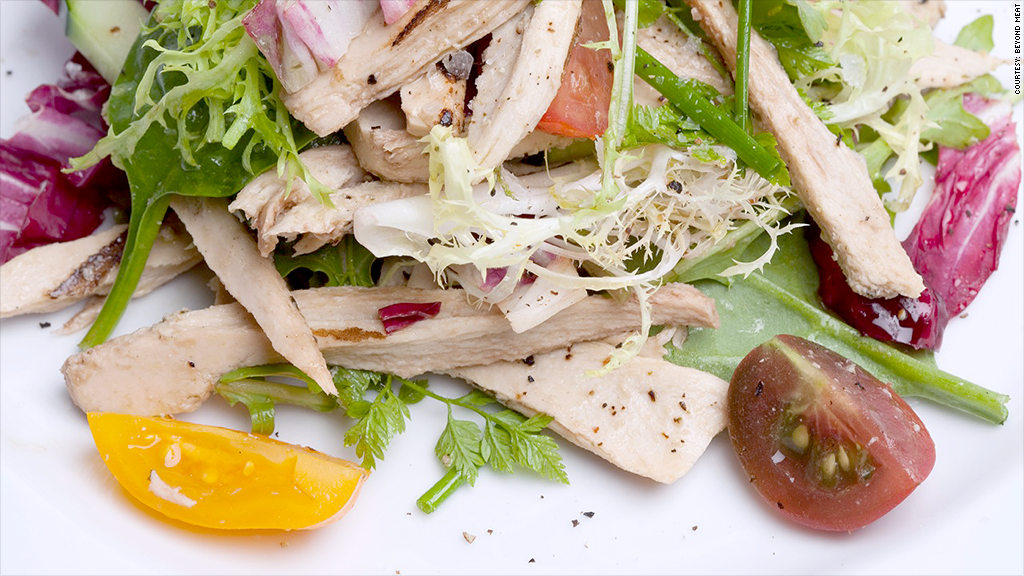
As Americans sharpen their knives for Thanksgiving dinner, a new crop of food tech start-ups are carving out their own niche -- faux-meat products that replicate the flavor and feel of the real thing without the ethical quandaries.
Forget about the Tofurky you tried at your cousin's vegan wedding. Companies like Beyond Meat and Hampton Creek Farms are using high-tech processes to synthesize meat and egg textures from plant proteins. The goal isn't replacement steak for vegans, says Beth Bloom, a food analyst with research firm Mintel, but to create an entirely new product that's actually full of flavor.
Beyond Meat is one company hoping to take advantage of the $553 million "meat-alternatives market." Founded in 2009 by Ethan Brown, the company manufactures low-fat, cholesterol-free, chicken-like strips that come in carnivore-friendly flavors like lightly seasoned and southwest style.
Hoping to "mimic the fiber structure of animal protein as it cuts across your teeth," Brown teamed up with University of Missouri professor Fu-Hung Hsieh, who spent 15 years fine-tuning a process that involves feeding plant-based ingredients into a machine called an extruder. Then, using a precise combination of heating, cooling and pressure, plant proteins are painstakingly realigned to mimic animal muscle or tissue.
"We're doing what evolution did over a very long period of time; it's just that we're doing it in less than two minutes," says Brown, whose company licenses the technology from Hsieh.
Related: Shop yourself within a few degrees of Kevin Bacon
In April, Beyond Meat launched their Chicken-Free Strips in Whole Foods stores. And restaurant chain Tropical Smoothie now offers Beyond Meat as a substitute for chicken in hundreds of locations in 36 states.
The company can produce the equivalent of more than 1.5 million chickens per year -- a fraction of the 8.6 billion chickens that will be sent to slaughter this year in the U.S. Yet its highly efficient production system is better for the environment (requiring less land and water while producing less waste), which has captured the attention -- and pocketbooks -- of big-name investors like Twitter (TWTR) co-founder Biz Stone.
"If you believe that it's possible to replicate the animal protein with plant protein, it makes for a pretty compelling investment," says Brown.
Related: How to boost your online sales this holiday season
Hampton Creek Foods is another food tech start-up attracting A-list investors, including Peter Thiel and Bill Gates. The two-year-old San Francisco-based company examined the molecular structure of over 1,500 plant species and identified 11 varieties that could replace the functions of a chicken egg, from adding volume to a pound cake to providing texture to a muffin.
The result is Beyond Eggs -- a plant-based egg substitute that's currently being sold to industrial manufacturers as a baking ingredient for their own product. And if investors have their way, it could eventually serve as an affordable source of protein in developing countries.
In October, Hampton Creek began selling its flagship product, JustMayo, in Whole Foods. JustMayo is an egg-free mayonnaise that the company says is 10% cheaper to manufacture than its non-vegan counterpart. And next year, Hampton Creek plans to release JustScrambled, the world's first plant that scrambles like an egg.
They don't quite replace the holiday meals of turkey and Cornish game hens, but they're getting pretty close.



